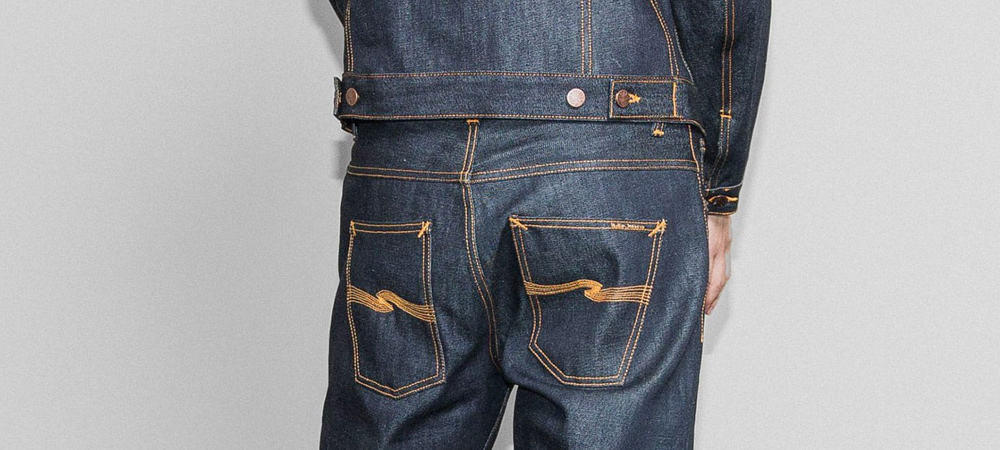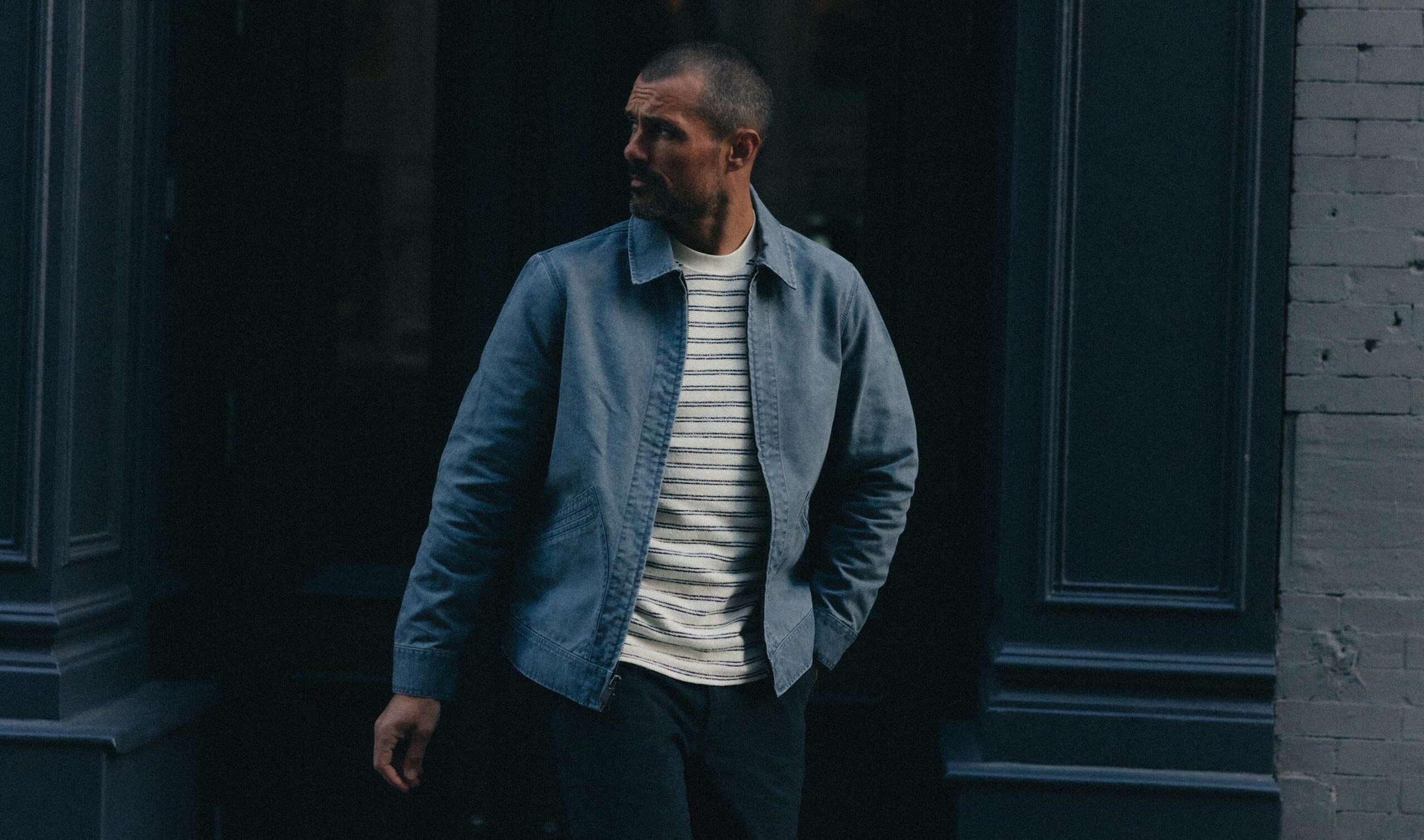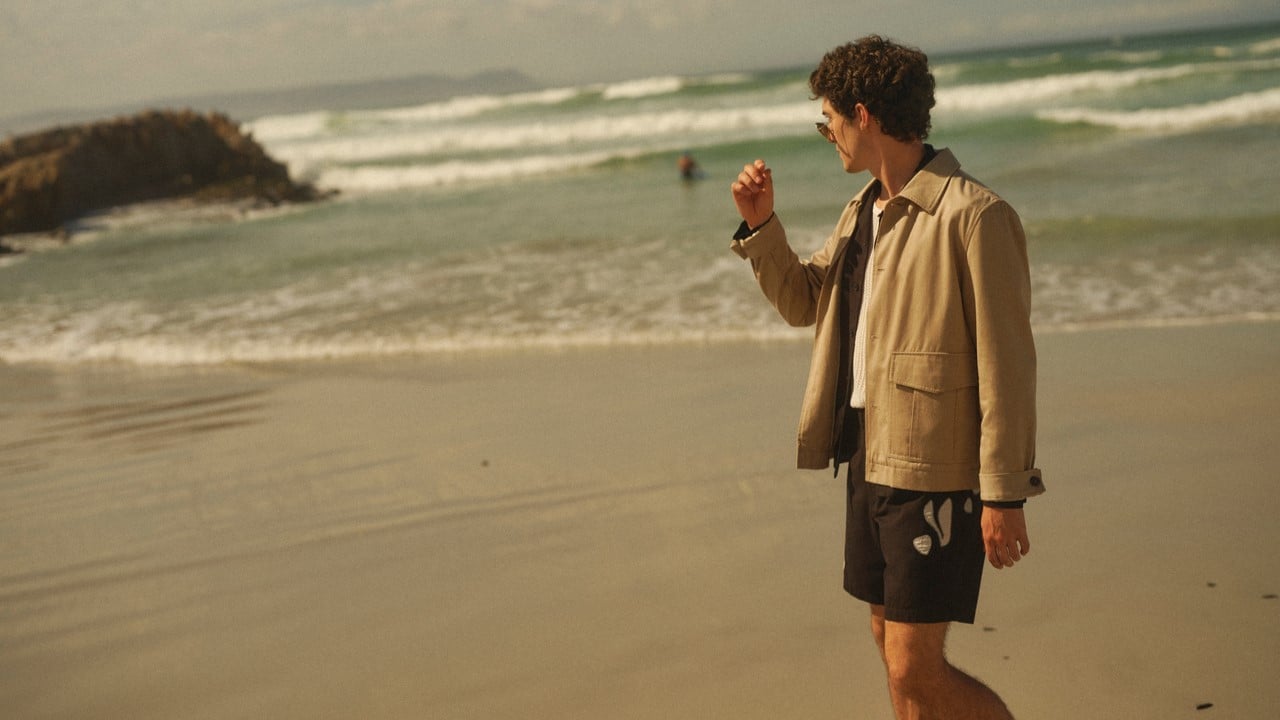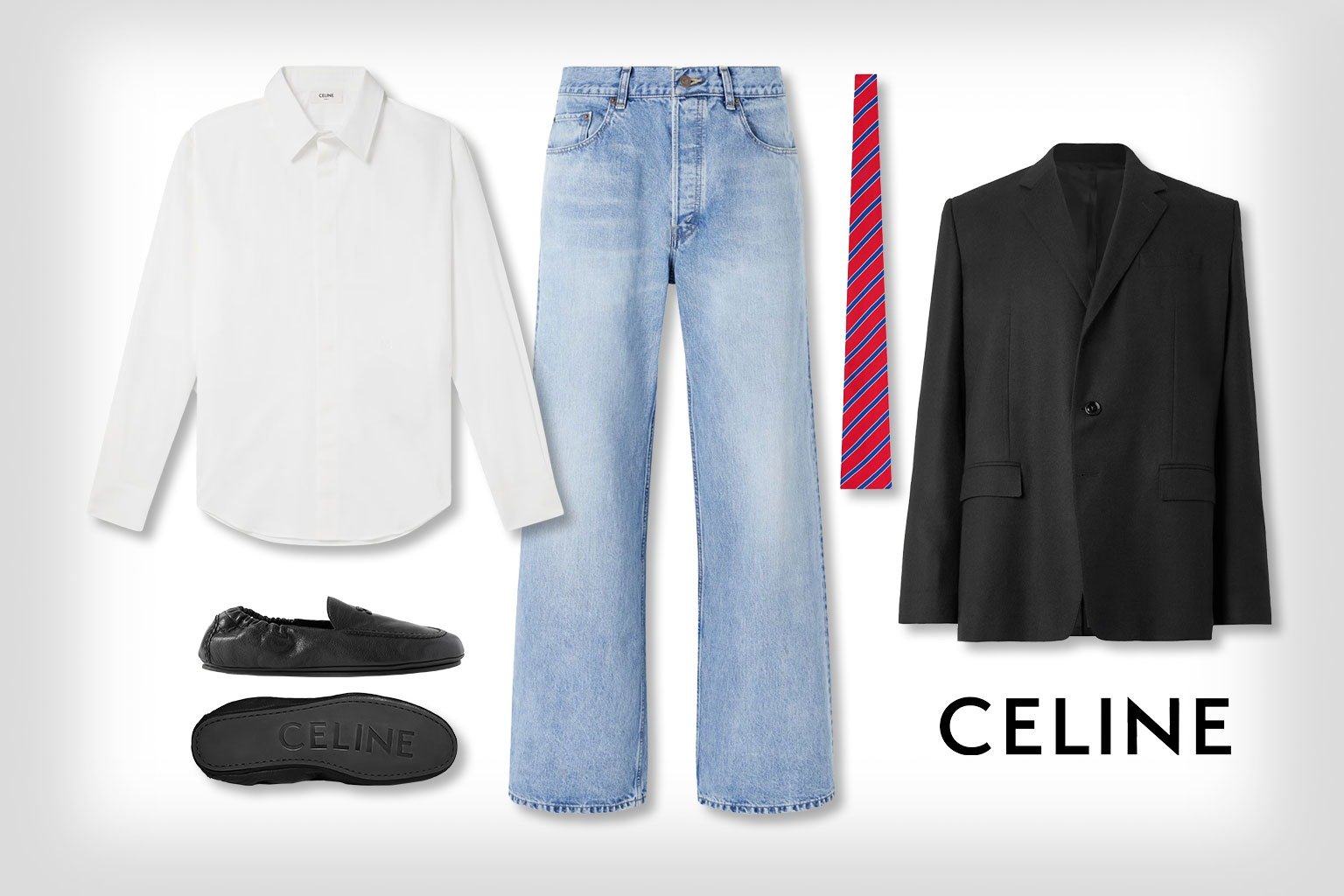Uniqlo x JW Anderson SS26 | Prep Goes Playful
Feb 25, 2026Everything You Need To Know About Raw Denim
- May 14, 2024
- 0 Comments
708

It’s painful, it’s expensive, it requires serious perseverance and if you’re not careful, it might just become something of an addiction. No, not bondage. This is something far less raunchy, yet every bit as daunting to attempt as a beginner. Welcome to the world of raw denim.
Just like quantum physics, Bitcoin and CrossFit, raw denim is something that you’ve almost certainly heard of, but probably still struggle to fully comprehend. And it’s no wonder. It’s probably the most difficult thing in menswear to wrap your head around – aside from perhaps Kanye West’s enduring status as a style icon.
What Is Raw Denim?
When you head down to the high street to pick up a new pair of jeans, the ones you take off the hanger will have been through more cosmetic procedures than an ageing Hollywood A-lister. They’ll have been dyed, washed, distressed, shrunk, stretched and all the rest of it, whereas raw denim is subjected to none of this bar the dyeing process. It’s taken straight off the loom (the machine on which the fabric is spun), sewn into something leg- or jacket-shaped and sold to you.
Levi’s
So why are you paying several times the price for something that has required less work? The answer is you’re not. Raw denim jeans are often made in small batches, by experienced hands, in high-cost labour countries like Japan and America. On top of that, they’re built to withstand a battering, using premium materials that far surpass the quality of their mass-market equivalents.
Unbranded
What Are the Benefits of Raw Denim?
The true benefits of raw denim lie in the fades and the fit. These jeans are stiff, dark and unforgiving at first, but over time they mould to the owner’s legs, loosen up and develop unique fade patterns in areas of wear (provided you don’t wash them too soon, but more on that later). These tend to include the backs of the knees (honeycombs), thighs (whiskers), the pockets where you keep your wallet/phone and where the denim stacks around the ankles.
“Raw denim enthusiasts appreciate high contrast fading that is achieved by rarely washing their denim,” explains David Giusti, a self-professed denimhead from Blackhorse Lane Ateliers , one of the UK’s finest jeans manufacturers. “This is to keep as much indigo on the garment as possible in low-wear areas, while also trying to wear as much indigo off of the garment in high-wear areas, creating high contrast.”
Raw Denim & Selvedge Denim: What’s The Difference?
Newcomers to the world of denim are often left flummoxed by the two main buzzwords: raw and selvedge. So let’s clear that up once and for all.
Raw Denim
Raw denim, as explained above, is denim that hasn’t undergone any sort of washing or distressing processes, leaving it stiff and full of deep blue indigo dye.
Selvedge Denim
Selvedge denim refers to the closed edges on denim that has been spun on a machine known as a shuttle loom. This is usually present as a white strip, visible when the jeans are cuffed or pinrolled , that gives a clean, finished look and prevents the material from unravelling. It’s more expensive to produce and is usually seen as a hallmark of quality denim.
The confusion occurs because raw denim often has a selvedge and vice versa. Although this is not always the case.
Sanforized Vs. Unsanforized Raw Denim
While raw denim in its truest form comes straight off the loom, a process called sanforization has become popular in recent years, which prevents the signature shrinkage that can make the process of buying raw jeans in the correct size almost as painful as wearing them for the first time.
Sanforized Denim
Unsanforized Denim
How to Pick the Right Raw Denim Jeans Size & Fit
All of these variables make picking out a pair of raw jeans that won’t leave you drowning in fabric or cut off your circulation notoriously tricky.
When it comes to how raw denim should fit, keep these tips in mind:
Go Up for Unsanforized, Go Down for Sanforized
As a rule of thumb, if you’re opting for unsanforized then go up one size to accommodate shrinkage. For sanforized, the opposite is true. This type of denim will stretch a fair bit over the first few weeks of wear, mainly in the seat, waist and thighs, so if you like a snug fit you’ll want to take that into account.
Consider the Style
Each raw denim jean will have a different style or fit. From skinny to boot cut, to straight leg and flares, you can find raw denim jeans in a huge variety of styles.
Personal preference aside, style also greatly influences the fit of your jeans.
It should go without saying that skinny jeans will fit much tighter than straight legs, and this is something to keep in mind if you aren’t a fan of wearing restrictive clothing.
Remember, raw denim takes more time to break in, so you want to make sure that you choose a style and fit that will be most comfortable on your body.
Think About the Rise
Aside from the leg style of the jeans, raw denim will come in different rises as well. If you want the jeans to sit lower on your hips, you may spring for a pair of low rise raw denim jeans. Alternatively, if you’d prefer a more retro look and feel, opt for a pair of more high waisted jeans.
When it comes to the rise, you want the jeans to fit snuggly on your body, rather than hanging loosely off your hips.
However, no matter what kind of raw denim jeans you wind up with, they’re bound to fit more tightly than other pairs, as it takes some time to break this rigid material in.
Nudie Jeans
How to Break in Raw Denim Jeans
Now the fun part. Breaking in raw denim isn’t the most pleasant of experiences. Imagine carrying out your day-to-day activities with your legs encased in cardboard and you’ll be halfway there. It’s so grim that A.P.C. even offers ‘Butler’ jeans, which have been broken in by someone else, prior to you buying them.
But stick it out. It may be difficult to believe at first but the same jeans that are making it almost impossible to get up and down stairs today will be the most comfortable pair you’ve ever owned in your life by the same time next year. It will pay off. Have faith. Don’t squat.
Wear Your Raw Denim Often
The fastest and easiest way to break in raw denim jeans is to wear them. Wear them around your house and while running errands to start to stretch them out a bit and form to your body. Eventually, natural creases will begin to appear around the places you sit, around the cuffs of the jeans, and items you have in your pocket.
Prepare for Discomfort
The downside to breaking in raw denim jeans is it isn’t the most comfortable process. The jeans will feel stiff on your body and will likely limit your range of motion in a serious way. You may also experience the dye rubbing off or “bleeding” of color.
For these reasons, you may not want to wear your jeans on a night out or over to your friend’s house that’s filled with white furniture.
Take a few weeks to really get the raw denim comfortable, and after that, you’ll never reach for another pair of jeans again.
A.P.C. Butler Program Jeans
Blowouts: What Are They And How Can You Fix Them?
When you rock the same pair of raw denim jeans every single day and never give them a wash to soften them up, it’s inevitable that holes are going to crop up in areas of wear. The most common place for this to occur is at the crotch. Those in the know call this a ‘blowout’.
Blowouts occur when the excess fabric in the crotch of the jeans rubs against itself with each step. Over time, this forms a hole and if you’re new to raw denim, it can be pretty disheartening. But you can postpone it.
Although it’s not really an option early on if you’re on a quest for decent fades, Hodgson says that washing jeans occasionally will help to keep the denim soft, reducing the risk of a blowout. “And avoid riding a bike,” he adds. “That puts a lot of pressure on the crotch.” Blackhorse Lane’s Giusti concurs: “In the battle between a leather or plastic bike seat, and a pair of cotton jeans, the seat will always win.
Nudie Jeans
Veteran denim nerds are well used to blowouts and see them as just another part of the raw denim experience. Every hole is an opportunity for a repair, which means another way to make your jeans slightly different from every other pair out there. Wear it like a badge of honour.
“Once the crotch shows signs of fraying, long before a blowout, get them reinforced with traditional darning or a patch sewn on the inside,” adds Hodgson. “This will really extend the life of the jeans. Blowouts are just part of the ageing process and cotton does wear out eventually.” The best thing is to embrace it.
How Often Should You Wash Raw Denim?
If you’re ever in need of some light entertainment, approach a group of denim nerds, ask them how and when it’s best to wash a pair of raw jeans, then sit back and watch the ensuing argument. The hotly-contended subject of washing is probably the most famous thing about raw denim. But is it really true that you shouldn’t wash your jeans? Well, yes and no is the answer.
For the vast majority of denim enthusiasts, the whole idea of going raw is to achieve bold, high-contrast fades. This is made possible by the excess dye in the fabric rubbing off over time. If you rinse the good stuff out before you’ve had time to break the jeans in properly, those whiskers and honeycombs just aren’t going to happen. Period.
At the same time, never washing your jeans can actually weaken the denim. “All of the sweat, oils and dirt that build up on one’s jeans effectively act as sandpaper, wearing down the cotton,” explains Giusti. “We recommend washing one’s jeans as little as you need to, but if they smell bad, you probably need to give them a wash.” However, if you want those coveted high-contrast fades, you should wear them for a minimum of six months before they go anywhere near a wash. This will allow time for creases to form and dye to fade, meaning that when you do finally clean them, they’ll have lost colour in all the right places.
Nudie Jeans
The Best Ways To Wash Raw Denim
So, when the time rolls around to de-funk your jeans, what are the best methods of denim care?
1. Freezer
Raw denim enthusiasts have a reputation for being a bit nutty. This stereotype is perpetuated by the fact that some of them like to store their legwear alongside their ice cream.
It may seem strange, but there is a logic behind it. During that initial six months to a year of continuous wear, jeans can develop a hum. Some think that putting them in the freezer will kill the odour-causing bacteria and keep them smelling fresh. But the actual science behind this is a little foggy.
2. Spot Cleaning
When you wear the same pair of jeans all the time, it’s inevitable that at some point they’re going to get sauce, a pint or some baby sick on them. The way to remedy this without a full wash is by spot cleaning.
Wet a cloth and dab the affected area, but don’t rub. You want to minimise how much of the dye you take off and scrubbing away like an angry maid is not going to help. Once dry, repeat again as needed.
3. Bathtub
When the time comes to finally wash your jeans, the bathtub method is the safest way to do it.
Fill the tub with lukewarm water, add a small amount of detergent (preferably a specialist product such as Woolite Black), then allow the jeans to soak for 30 minutes. Once you’ve done this, you can give them a gentle scrub to remove any dirt, then take them out and leave them to dry.
4. Washing Machine
For the most hardened of raw denim fanatics, putting a pair of jeans anywhere near a washing machines is an offence grave enough to see you stripped of your selvedge stripes. However, it can be done, as long as it’s handled carefully.
Using Woolite Black detergent and nothing else, place your jeans into a front-loading washing machine and use either the delicate or hand-wash setting. Make sure its cold too – you don’t want to risk any shrinkage.
5. Sea
Just when you thought things couldn’t get any more ridiculous. It may sound farfetched, but one method of washing favoured by some hardcore denimheads is to take your jeans for a dip in the sea.
The idea is to wear them, go for a paddle, come out, rub them with sand and then allow them to dry in the sun. Will it make your jeans look any better? Maybe. Are people likely to try and have you sectioned? Almost certainly.
The Best Raw Denim Brands
Hey, no one said it was going to be easy. As you’ve no doubt twigged by this point, doing raw denim properly takes patience, dedication and a surprising amount of knowhow. But if you’re ready to get faded, these are the brands to have on your radar.
Edwin
Japanese fashion’s long-running obsession with denim began in the early 1950s. But Nippon’s premier manufacturer had already been running its looms long before then.
Today, Japan is a country famed for producing some of the best jeans you can buy and OG label Edwin has had a big role to play. For the best Japanese denim cloth, served with a hearty dose of heritage, this is the first place to go.
Buy Now
A.P.C.
Parisian style is hardly known for its ruggedness or machismo – two qualities so often attributed to raw jeans – which is why it comes as quite a surprise that French label A.P.C. actually makes some of the best entry-level raw denim around.
The Petit New Standard has become nothing short of a wardrobe staple for style-savvy guys and is arguably the ultimate slim-fit jean. Expect pared-back styling, next-level quality and fit that is second to none.
Buy Now
Levi’s
You can’t have a list of denim brands without mentioning the company that started it all, back at a time when the word ‘jeans’ didn’t even exist and they were simply referred to as ‘waist overalls’ (catchy).
The Levi’s 501 and 511 styles are genuine menswear classics and both are available in Levi’s raw denim – which it calls ‘rigid’. If you like your clothing to come with a story, it doesn’t get much better than this.
Buy Now
Nudie Jeans
Swedish denim brand Nudie was set up in Gothenburg by Maria Erixon, who loved jeans because “the more you wear and repair [them], the more character they have.” It’s a philosophy that is in keeping with the whole idea behind raw denim, so naturally, it’s something that Nudie does well.
Expect slim cuts, signature back pocket branding and prices that won’t leave you trying to negotiate your next phone bill payment using an assortment of beans and pocket fluff.
Buy Now
Samurai
Founded in 1998, Japanese brand Samurai makes some of the most coveted raw denim on the market. With only a handful of global stockists, the products are notoriously tricky to get hold of, making them all the more enticing to fade-hungry denimheads.
The selvedge line on each pair of Samurais features a single strand of silver lamé running through it to represent the glint of a samurai sword blade. And if that’s not the coolest thing you’ve ever heard, we’re not sure what is.
Buy Now
Unbranded
A sub-brand of renowned raw denim peddlar Naked And Famous, Unbranded offers more affordable jeans for those looking to dip their toes into the world of unwashed denim. Following a motto of “No branding, no washes, no embroidery, no ad campaigns and no celebrities,” Unbranded is about as bare bones as they come. And with jeans made in the same factory as A.P.C., you can’t really go wrong.
Buy Now
Naked And Famous
Poking fun at celebrity-obsessed culture and ‘glamour brands’ that price jeans per celebrity endorsement as opposed to quality, Naked and Famous is a brand that takes its craft very seriously.
You won’t find any high-profile ad campaigns or gimmicks here, but what you will find is the best-quality denim, premium construction and jeans made by people who are passionate about what they do.
Buy Now
Rag & Bone
While it may not be a label that deals exclusively in denim, New York-born Rag & Bone has earned a reputation among legwear lovers for the quality and craftsmanship of its jeans. It’s no wonder people love them. Rag & Bone’s jeans are clean, great fitting, well-made and woven from high-quality materials. They might not be heavier than a small child, but the brand’s skinny jeans in particular look great and are built to last.
Buy Now
Evisu
It may be best-known for the giant, painted gull logo that adorns so many pairs of its jeans, but Japanese label Evisu also makes some knockout raw denim.
The Osaka-born company has been doing its thing since 1991 and in that time has established itself as the label of choice for the hip-hop community. If bold logos and in-your-face detailing are your thing then a pair of Evisus will be right up your street.
Buy Now
Iron Heart
A brand designed by bikers, for bikers. Iron Heart is a biker brand through and through and has a reputation as such in its native Japan. However, here in the west, its rugged, raw, selvedge denim has found a home in the luxury jean market.
The brand is well-known for its seriously heavy denim weights, so make sure you’re prepared for a painful break-in process before you take the plunge.
Buy Now
Blackhorse Lane Ateliers
The UK is known for many things but high-end raw denim has never really been one of them. Well, not until East London’s Blackhorse Lane Ateliers set up shop anyway.
The Walthamstow establishment may only be two years old but its team of skilled craftsmen and women boast a huge degree of experience and a love for their trade that runs deep. Blackhorse Lane even runs classes where participants can make their own pair of jeans. And given that raw denim is all about individuality, it doesn’t really get much more personalised than that.
Buy Now
Tellason
Japan takes most of the glory for anything raw denim-related these days but the truth is that the Americans aren’t half bad either.
Tellason jeans are woven in San Francisco, using the finest Cone Mills denim from North Carolina. Even the leather waistband patch is made by Tanner Goods in Oregon. If ever there was a pair of all-American jeans, this is probably it.
Buy Now
Publisher: Source link







